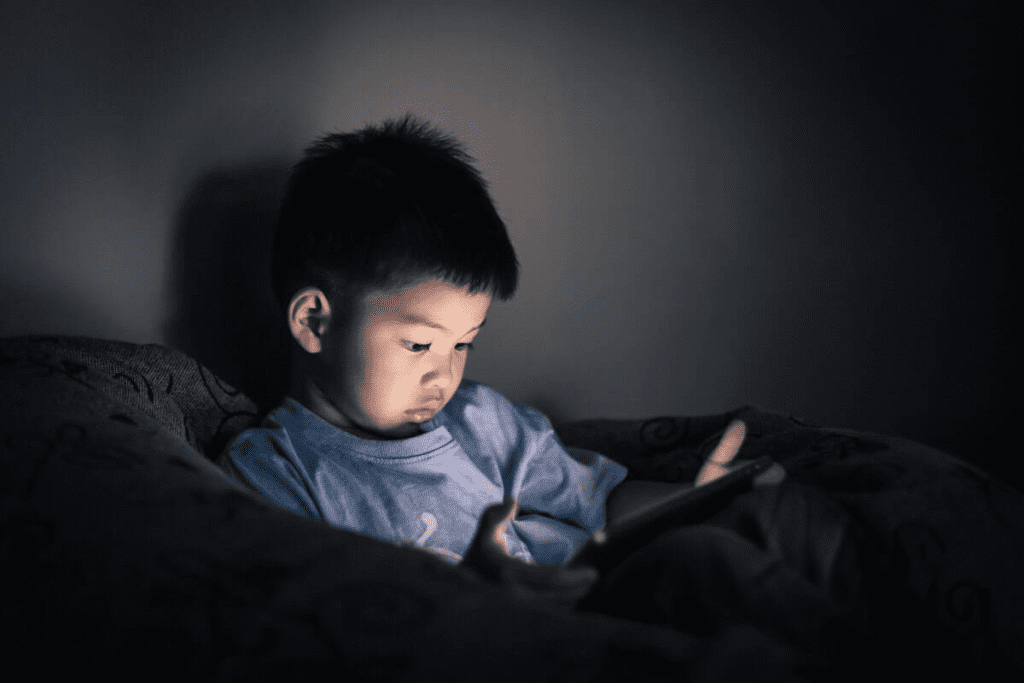Last Updated on November 17, 2025 by
Watching too much TV in early childhood can lead to delays in important skills, highlighting the negative effects of screen time on child development. This includes difficulties in talking, solving problems, and handling sensory information. Studies show that young children who spend more time watching TV are more likely to face these developmental delays.
A recent study found a big problem. One-year-olds who watched over four hours of TV each day had big delays by ages two and four. These delays were in talking and solving problems.

Too much screen time for kids under 18. They say it’s okay for video chatting. As parents worry about TV’s impact on their kids’ growth, knowing the risks of too much screen time is key.
In today’s world, kids are exposed to screens more than ever before. This has raised big concerns about how it affects their growth. Kids start using media much earlier now, from four years in 1970 to just four months today.
The reason for this change is the easy access to digital devices. Also, more educational and fun content is made for young kids. So, it’s important to look at how much screen time kids have and how they use media.
Studies show that kids are spending a lot of time in front of screens. Here are some key facts:

How kids watch media has changed a lot. With streaming and mobile devices, they can watch anything anytime.
Some trends in media use by young kids include:
As media use changes, it’s key for parents and caregivers to understand its impact on kids’ development.
It’s important for parents and caregivers to know about early childhood development milestones. This knowledge helps spot any delays early on. Early childhood growth covers physical, cognitive, and emotional areas. Both genetics and environment play a part in a child’s development.
Children change a lot from birth to age 5. Some major milestones include:
These stages are vital. Any big delays could mean there’s a problem that needs attention.
Environmental factors greatly shape a child’s brain growth. Nurturing environments with enough stimulation and support help a lot. Important environmental factors include:
These factors greatly affect a child’s growth path. Knowing their importance helps parents and caregivers create supportive environments. This promotes healthy development.
Screen time is a big worry for parents and experts. Too much screen time can harm a child’s growth. It can cause delays in development and problems with talking, solving problems, and handling senses.
Studies show that too much screen time can mess with a young child’s brain. Being on screens too early can change how the brain works. This can lead to lasting problems in thinking and behaviour.
The young brain is very sensitive to screens. Too much screen time can make kids rely on digital media for fun. This can stop them from learning to think critically and solve problems.
The displacement theory says screen time takes away from important activities. Screen time replaces physical play, socializing, and reading. These are key for growing motor skills, learning to get along with others, and thinking well.
When kids watch screens a lot, they miss out on play and hands-on learning. This can slow down their motor skills and cut down on learning about feelings and social skills.
To help kids grow right, we need to balance screen time with other activities. Parents and caregivers should limit screen time. They should also make time for physical play, reading, and socializing.
Studies show that too much screen time can cause communication and language delays in kids. This is a big concern. Kids who watch screens a lot don’t get to do other things that help them learn language.
Excessive screen time is linked to a higher risk of communication and language delays. A key study in JAMA Pediatrics in 2023 found a strong connection between screen time and language issues.
The 2023 JAMA Pediatrics study showed a big link. Kids who watched more than 4 hours of screens at 1 year old were almost 5 times more likely to have communication delays by 2. This study stresses the need to watch how much screen time young kids have.
“Children who spent more time watching screens at age 1 were at a significantly higher risk of experiencing communication delays by age 2.”
Children under 2 are very sensitive to too much screen time’s impact on language. At this age, they start learning language. Too much screen time can slow down this learning.
Knowing the risks of too much screen time helps parents and caregivers. They can take steps to help young children develop language healthily.

Screen time is growing among kids, worrying parents about its impact on physical growth. Motor skills are key for daily tasks and interacting with the world.
Too much screen time can slow down fine motor skills. Fine motor skills are about small muscle movements. They’re needed for writing, dressing, and using utensils. Kids who watch more screens do fewer physical activities like puzzles and building blocks.
Research shows kids on screens less often have weaker fine motor skills. For example, a child watching TV or playing games might find it hard to tie shoelaces or button a shirt.
The Canadian Pediatric Society says less screen time is better for kids. They suggest kids do various activities to help with physical and brain growth.
Physical play is key for both fine and gross motor skills. Running, jumping, and climbing boost gross motor skills. Playdough, colouring, and puzzles improve fine motor skills. It also boosts creativity, problem-solving, and social skills.
Parents can help by creating a safe play area. They can play with their kids and limit screen time. This way, they support healthy motor skill growth.
Too much screen time can harm children’s minds. Studies show it affects their thinking and problem-solving. This is a big worry for parents and experts.
A study followed 2,441 kids. It found that too much screen time at a young age can hurt their scores later. This study is a big warning about screens and kids.
It’s key to watch how much screen time kids have early on. Parents and caregivers can help by finding other fun activities. These activities help kids think better and solve problems.
Too much screen time can make kids less focused and hurt their ability to plan and solve problems. These are important skills for kids to learn.
Watching TV too much can slow down these skills because it’s not active. But playing and doing hands-on activities can really help kids grow.
Being able to think critically is very important for kids. It helps them understand and make good choices. But TV watching can make it harder for them to develop this skill.
Knowing how screens affect kids’ minds helps parents make better choices. This way, they can help their kids stay healthy and smart.
Too much screen time can harm children’s development. It affects their social-emotional and sensory skills. Children miss out on important experiences when they’re glued to screens.
A study by Drexel University found a scary link between young screen time and sensory issues. It showed that more TV at 18 months raises the risk of sensory problems by 23% for each hour.
This study highlights the dangers of too much screen time for young kids. Sensory problems can make sounds or textures too much, or make it hard to see things clearly.
Atypical sensory processing means kids have trouble with sensory information from the world. They might be too sensitive or not sensitive enough. This can make it hard for them to do everyday things, play with others, and control their feelings.
Face-to-face talks are key for kids’ emotional smarts. They learn to handle their feelings, feel for others, and get better at social stuff. Unlike screens, real talks give instant feedback and teach kids about social cues.
Promoting healthy social-emotional development means giving kids chances for real talks. Parents and caregivers can do this by:
By watching screen time and focusing on real talks, parents can help kids grow up with the social and emotional skills they need for life.
Creating healthy media habits is key for young children’s growth. The American Academy of Pediatrics suggests limited screen time for kids under 18 months, except for video chatting. For kids aged 2-5, they recommend no more than 1-2 hours of non-educational screen time.
Parents can encourage healthy habits by promoting activities like physical play, reading, and face-to-face interactions. These activities help with cognitive, social-emotional, and motor skills. This way, parents can help their children develop well-rounded habits.
By following these guidelines, families can create a supportive environment. This environment helps children grow and succeed in the long run.
Too much screen time can harm kids. It can cause delays in development, like talking and moving. It also affects thinking and social skills.
Screen time can take away from important activities. It replaces play and talking face-to-face. Too much can harm how the brain grows.
The American Academy of Pediatrics says little screen time for kids under 18 months. Video chatting is okay, though.
Many American kids spend a lot of time on screens. Their screen time patterns are changing, though.
Screen time can hurt early development. It affects growth from birth to age 5. The environment also plays a big role in brain development.
Yes, too much TV can slow down young kids. Babies under 2 are most at risk for language delays.
Babies shouldn’t watch too much TV. It can harm their brain and replace important activities like playing and talking.
Too much TV can cause delays in development. It can also lead to problems with talking, moving, and social skills.
Parents can limit screen time and encourage other activities. They should also teach critical thinking skills.
Parents can encourage physical play. They should also promote outdoor activities and play with their kids.
Too much screen time can hurt thinking and focus. It can also make it harder to think critically because TV is passive.
Too much screen time can lead to sensory problems. Face-to-face interactions help with emotional intelligence.
Subscribe to our e-newsletter to stay informed about the latest innovations in the world of health and exclusive offers!